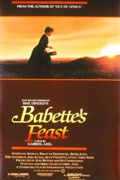
Directed by
Gabriel Axel
103 minutes
Rated PG
Reviewed by
Bernard Hemingway


Babette's Feast
Winner of the 1987 Academy Award for Best Foreign Language Film, Babette's Feast is a skilfully-crafted portrayal of the conflict between the worldly and the spiritual.which director Gabriel Axel adapted from a simply plotted yet richly textured Karen Blixen/Isak Dinesen novella.
Stéphane Audran stars as the quietly determined cook of the title, who through a magnificent banquet repays the kindness of the daughters of a deceased pious Dutch pastor who live on the desolate Denmark coast gave her refuge after she fled Paris due to her (unidentified) role in the Communard Uprising of 1871.
Thematically Babette’s Feast recalls the films of Dreyer and Bergman (Birgitte Federspiel, who plays Martina also played the female lead in Dreyer’s Ordet (1955), which also dealt with a similar Jutland religious community). Unlike his famous predecessors , Axel lovingly contrasts the rigour and spareness of the isolated Jutland Puritan community with the life-celebrating joys of a French table which are beautifully portrayed by the cinematography of Henning Christiansen. Also unlike them, God and his minister are relatively benign presences here much as Axel himself has much more benign, and one might say sentimentalizing, sensibility than either of the Scandinavian masters. It is nevertheless a charming film that works precisely because it is so understated in presenting its story, Babette remaining virtually silent throughout but nevertheless, through Audran's performance and Axel's direction, saying all that she needs to say.
Want something different?





